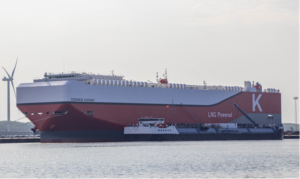“K” LINE begins use of bio-LNG fuel

Kawasaki Kisen Kaisha has marked a significant milestone in its decarbonization strategy with the first use of bio-LNG fuel on board its car carrier OCEANUS HIGHWAY.
The operation took place on June 16, 2025, when the vessel was bunkered with 500 tons of bio-LNG supplied by Shell Western LNG B.V. at the Port of Zeebrugge, Belgium.
The fuel, known as liquefied bio-methane, is produced from renewable organic waste and residue and is ISCC-EU certified. Notably, it has a lifecycle carbon intensity of less than zero, meaning it can contribute to net-negative greenhouse gas emissions from production through to consumption.
As a drop-in fuel, bio-LNG is fully compatible with existing LNG infrastructure, making it an immediately viable solution for reducing carbon emissions in maritime transport.
Dexter Belmar, Vice President of Shell Downstream LNG, highlighted the significance of the initiative, stating ‘K’ LINE builds critical momentum for decarbonizing the shipping sector, as availability and viability increase, with bio-LNG becomes a more powerful tool in the transition to cleaner fuels.
Hiroto Arai, General Manager of “K” LINE’s Environmental/Technical Strategy Group, emphasized that the initiative is part of a broader push toward net-zero greenhouse gas emissions by 2050.
He noted that beginning to use bio-LNG represents a meaningful advancement toward the company’s environmental targets and reinforces its alignment with global decarbonization efforts.
This development forms part of “K” LINE’s Environmental Vision 2050: Blue Seas for the Future, which outlines a strategy to reduce CO₂ emissions efficiency by 50% by 2030 surpassing the IMO’s target of 40%, and to reach net-zero emissions by 2050.
As part of this roadmap, the company will continue exploring low-impact fuel technologies and expand the use of renewable alternatives such as bio-LNG.
![]()
The post “K” LINE begins use of bio-LNG fuel appeared first on Container News.
Content Original Link:
" target="_blank">

































































